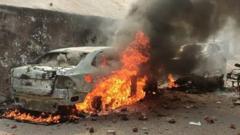Sambhal city in Uttar Pradesh, India, has been rocked by violence following clashes during a court-ordered survey of the historic Jama Masjid mosque, leading to three fatalities and numerous injuries. The unrest began when a local court mandated the survey after claims that the mosque was constructed on a site of a demolished temple. As tensions escalated, 21 individuals were arrested, and local authorities suspended internet services and closed schools for a day to maintain order.
Onlookers captured chaotic scenes as protesters allegedly hurled stones at police, who responded with tear gas and plastic bullets. Superintendent of Police Krishan Kumar has refuted claims that police fired lethal weapons, asserting that non-lethal measures were employed for crowd control. Allegations persist that three men were fatally shot during the violence, with police identifying the victims as Naeem, Bilal, and Nauman.
This event forms part of a larger narrative surrounding contentious religious disputes in India, particularly relating to the historical treatment of mosque sites by Hindu nationalist groups. In Sambhal, discontent grew following the swift execution of the survey amidst protests from Muslim residents, who criticized the lack of notification and perceived urgency from the court. As opposition leaders voice concerns about political motivations behind the chaos, state officials assert that investigations are underway.
Mahmood Madani, a prominent Islamic leader, has condemned the ongoing religious conflicts, emphasizing that they infringe on Indian legal principles. The situation in Sambhal underscores the deep-seated tensions that remain within Indian society surrounding religion and historical grievances.
Onlookers captured chaotic scenes as protesters allegedly hurled stones at police, who responded with tear gas and plastic bullets. Superintendent of Police Krishan Kumar has refuted claims that police fired lethal weapons, asserting that non-lethal measures were employed for crowd control. Allegations persist that three men were fatally shot during the violence, with police identifying the victims as Naeem, Bilal, and Nauman.
This event forms part of a larger narrative surrounding contentious religious disputes in India, particularly relating to the historical treatment of mosque sites by Hindu nationalist groups. In Sambhal, discontent grew following the swift execution of the survey amidst protests from Muslim residents, who criticized the lack of notification and perceived urgency from the court. As opposition leaders voice concerns about political motivations behind the chaos, state officials assert that investigations are underway.
Mahmood Madani, a prominent Islamic leader, has condemned the ongoing religious conflicts, emphasizing that they infringe on Indian legal principles. The situation in Sambhal underscores the deep-seated tensions that remain within Indian society surrounding religion and historical grievances.





















